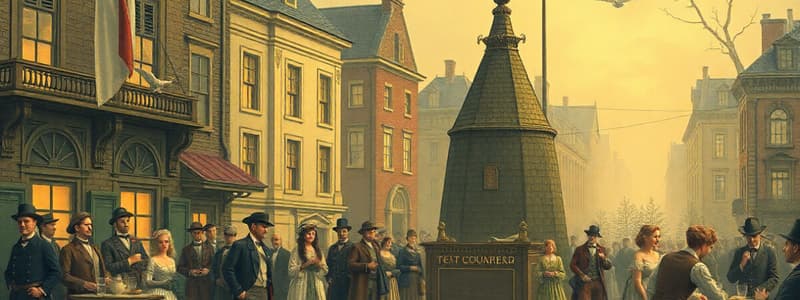Podcast
Questions and Answers
The Stamp Act required every piece of paper sold in the American colonies to carry a special tax stamp.
The Stamp Act required every piece of paper sold in the American colonies to carry a special tax stamp.
True (A)
Colonists supported the Stamp Act because it gave them a voice in Parliament.
Colonists supported the Stamp Act because it gave them a voice in Parliament.
False (B)
The Boston Tea Party involved colonists throwing tea into the harbor as a form of protest.
The Boston Tea Party involved colonists throwing tea into the harbor as a form of protest.
True (A)
The Intolerable Acts were a response to the colonies' protests against British taxation.
The Intolerable Acts were a response to the colonies' protests against British taxation.
The Boston Massacre resulted in the deaths of five British soldiers.
The Boston Massacre resulted in the deaths of five British soldiers.
Colonists were divided between those who wanted independence and those who wanted to remain loyal to the king.
Colonists were divided between those who wanted independence and those who wanted to remain loyal to the king.
The First Continental Congress met in 1776 to declare independence from Great Britain.
The First Continental Congress met in 1776 to declare independence from Great Britain.
British troops were initially successful in capturing the weapons at Lexington and Concord.
British troops were initially successful in capturing the weapons at Lexington and Concord.
Women protested against the Stamp Act by weaving their own cloth at home.
Women protested against the Stamp Act by weaving their own cloth at home.
Colonial militias were groups of volunteers prepared to fight British forces.
Colonial militias were groups of volunteers prepared to fight British forces.
Flashcards
Stamp Act
Stamp Act
A tax imposed by the British Parliament on all printed materials in the American colonies, requiring a special stamp on each piece of paper.
Colonial Protests
Colonial Protests
Reactions by American colonists against British policies, particularly the Stamp Act, arguing for representation in Parliament and opposing unfair taxes.
Boston Massacre
Boston Massacre
A clash between British soldiers and colonists in Boston in 1770, where five colonists were killed, escalating tensions between Britain and its colonies further.
Boston Tea Party
Boston Tea Party
Signup and view all the flashcards
Intolerable Acts
Intolerable Acts
Signup and view all the flashcards
First Continental Congress
First Continental Congress
Signup and view all the flashcards
Lexington and Concord
Lexington and Concord
Signup and view all the flashcards
Colonial Militias
Colonial Militias
Signup and view all the flashcards
Patriots
Patriots
Signup and view all the flashcards
Loyalists
Loyalists
Signup and view all the flashcards
Study Notes
Taxes and Protests
- In 1765, King George III of Great Britain needed money to rule his empire. Parliament imposed a new tax called the Stamp Act. Every piece of paper sold in the American colonies had to carry a special stamp.
- Colonists felt the Stamp Act was unfair. British citizens had the right to elect representatives in Parliament, but colonists did not.
- Colonists protested the Stamp Act and it was repealed. Other taxes were imposed thereafter, and women protested a tax on imported British cloth by making their own.
- Boston Tea Party: Colonists protested the tea tax by throwing tea into Boston Harbor.
Boston Massacre and Further Protests
- In 1770, British soldiers shot into a crowd in Boston, killing five colonists. This event was known as the Boston Massacre.
- By 1773, most taxes had been canceled, except the tax on tea.
- Colonists dressed in disguise and boarded British ships in Boston Harbor where they dumped tea into the water (Boston Tea Party).
Revolution Begins
- King George punished the colonies by closing Boston's port and banning town meetings (Intolerable Acts).
- Colonists disagreed on how to respond. Patriots wanted independence. Loyalists wanted peace. Many colonists were unsure.
- A convention of representatives from each colony met (First Continental Congress) in Philadelphia in 1774. They sent a peace proposal to the King.
- Rumors spread that British troops were marching to capture weapons the patriots hid near Boston.
Colonial Militias and the Start of the War
- Colonial militias (groups of volunteers) were ready for a fight.
- The British troops attacked the militias at Lexington and Concord in April 1775.
- The militias fought back, surprising the British and causing them to retreat.
Studying That Suits You
Use AI to generate personalized quizzes and flashcards to suit your learning preferences.
Description
Test your knowledge on the pivotal events of colonial protests against taxation in America, including the Stamp Act, the Boston Tea Party, and the Boston Massacre. This quiz will challenge your understanding of how these protests shaped the path toward independence.




